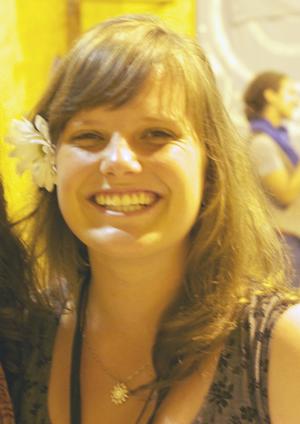
By Sarah Wurst
In the summer of 2009, I was fortunate enough to go on a St. Ambrose University Study Abroad trip to Ecuador.
I had originally signed up for the trip hoping to take a course in Liberation Theology, but because I was the only student who enrolled in the course, ended up completing my foreign language requirement instead. Thus, in between grueling Spanish classes and weekend hiking trips in the Andes, I embarked on my own study of the theology of Ecuador.
What I discovered continues to affect me and has guided me to where I am today, in my first year as a graduate from the diocesan university in Davenport. Because of the eye-opening opportunities that St. Ambrose provided for me, I have been able to make unorthodox and life-giving decisions that I may not have considered otherwise. My trip to Ecuador was one such experience.
I lived with a family in Cuenca and studied at CEDEI, the local school for Interamerican studies. As I got to know my host family, my teachers and my neighbors, I was spellbound by the blend of Catholicism and the traditional indigenous agrarian religions that seemed to be the norm. I attended both Catholic Masses and mountaintop shamanistic ceremonies that encapsulated many of the same beliefs. The part of Catholicism that knows and lives within the natural world is more alive in Ecuador, a country still underdeveloped enough to feel the awful power and infinite wonder of God’s creation.
As I lived and breathed in the salsa-sunshine of the streets of Cuenca, I began to notice things: one was my humbling ineptitude of the Spanish language and the helplessness and lack of freedom which that caused. The second was an increasing dependency on the ingenious variety of ways Ecuadorians serve bananas. And the third was what at first seemed like minor differences in religious statuary: crucifixes were by far more graphic and bloody, and St. Francis’ bluebirds had been replaced by skulls.
As I looked into these unsettling incongruities, I discovered that they were tied to Ecuador’s tumultuous history. The people of Ecuador are not strangers to violence, disorder, oppression and suffering. The indigenous populations have been especially affected by these forces. As I got myself into that mindset, I realized this was a population who required a Christ model that deeply and compassionately understood what it meant to suffer and could walk with the people through their experiences.
St. Francis, too, was historically more than the symbol of peaceful friendship with animals; he was a fierce ally for the oppressed and poor. Many of St. Francis’ writings deal with how, if one has lived a life following Christ, death can be greeted as a sister. If a person has lived a life of poverty and suffering, death is also a welcome means to enter into Christ’s promises of the afterlife.
These beliefs, what I now saw as so essential for the Catholicism of Ecuador, were so foreign to the comfort and security that I was used to hearing preached. It made me question what exactly being a Christian, and specifically a Catholic, was about. And, to an extent, reject the notion that I could do so and still seek financial security, comfort and luxury. I recognize Ecuador as the first time I really understood what the call to solidarity with my poor brothers and sisters really meant in my life of faith.
(Sarah Wurst is a 2011 graduate of St. Ambrose University in Davenport. She is spending a year with the Jesuit Volunteer Corps Northwest on the Crow Indian reservation in Montana.)








